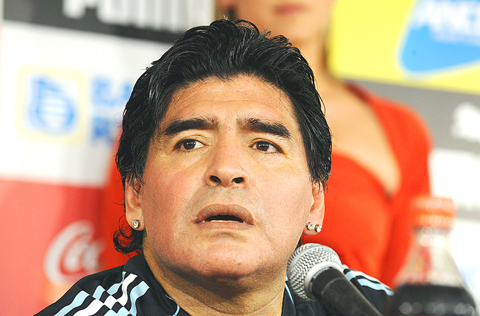Diego Maradona’s sexually explicit, foul-mouthed rant at his growing army of media critics, which overshadowed Argentina’s World Cup qualification, drew a scathing response on Thursday.
Maradona had just overseen a 1-0 win over Uruguay in Montevideo that allowed the two-time world champions to squeeze nervously into the 2010 finals in South Africa when months of simmering rage finally boiled over.
“There were those who did not believe in this team and who treated me as less than nothing,” said Maradona, whose team had endured a chaotic, lackluster qualifying campaign.

PHOTO: AFP
“Today we are in the World Cup finals with help from nobody but with honor. To all of you who did not believe in us, and I apologize to all the women here, you can suck it and keep sucking it,” he added, repeating the phrase.
Maradona, 48, a sporting icon in Argentina after skippering the 1986 World Cup winning team, enjoyed a honeymoon period at the start of his coaching reign before the knives began to be sharpened.
PILLORIED
He was widely pilloried for the record 6-1 World Cup qualifier defeat in Bolivia and his relationship with the country’s soccer-obsessed sports media never recovered.
Three more losses — against Ecuador, Brazil and Paraguay — threatened to dump Argentina out of the World Cup picture for the first time since 1970.
“A festival of rancor,” headlined La Nacion newspaper, which wrote that “Maradona was devoured by anger ... by a surplus of tension which finally exploded in the form of vindictive outbursts against journalists.”
“Provocative, insolent. These obscenities will go round the world, increasing the shame. The team continues to go to the dogs,” it said.
Maradona’s outburst has already become a sensation with Internet sites selling T-shirts emblazoned with the phrase “They can keep sucking it.”
Argentina’s faltering campaign, in which Maradona called-up 78 players and presided over four wins and four defeats, will lead to more questions over the coach’s future.
The biggest-selling newspaper in Argentina, Clarin, blasted Maradona’s outburst at the news conference which also saw him grab his testicles before gesturing at the TV cameras.
“On the night that he achieved his objective, instead of relaxing and savoring the moment, he vented his aggression,” the newspaper said.
FUTURE
Maradona will discuss his future as national coach next month with Argentine football federation (AFA) chief Julio Grondona.
But his outburst has not helped his cause.
In a survey, carried out by La Nacion’s Internet edition on Thursday, 79 percent of readers said that the AFA should sack Maradona.
Later on Thursday, Grondona refused to condemn Maradona’s outburst.
“In the heat of the moment, people say things that they later regret,” said the AFA chief, adding that he believes Maradona will continue in the job.
“I’m not thinking of a change. Diego, like us, has the power to improve things,” he said.

SIBLING RIVALRY: Marc Marquez was locked in a duel with his little brother, falling behind at one point before recovering for his first season-opening victory since 2014 Six-time world champion Marc Marquez yesterday won the MotoGP season-opening Thailand Grand Prix to complete a dominant debut weekend at his new Ducati Lenovo Team, having also romped to Saturday’s sprint. The Spanish great took the 26-lap grand prix by 1.732 seconds for his 63rd MotoGP victory from younger brother Alex Marquez, who is still seeking a first checkered flag, with Francesco Bagnaia third to complete an all-Ducati podium. It completed a perfect weekend for Marc Marquez, who took pole position, the sprint victory and the grand prix win for a maximum 37 points to open the 22-leg 2025 campaign. He led from

Team Taiwan avoided missing the World Baseball Classic (WBC) for the first time by defeating Spain 6-3 in a do-or-die game in Taipei last night. After narrowly escaping a mercy-rule loss to Spain in the WBC Qualifiers opener on Friday last week, the home team — winner of last year's WBSC Premier12 title three months ago — got their revenge against the 2023 European champions at Taipei Dome. "It felt quite different from when we won the Premier12," Taiwan captain Chen Chieh-hsien (陳傑憲) said after the game, recalling the ups and downs the team has experienced over the past few days. Unlike in

LONG TIME COMING: With the addition of Marcus Smart, the Washington Wizards finally held a team to under 100 points, the last team this season to do so The Detroit Pistons on Monday won their seventh straight game in the NBA with in-form Cade Cunningham making 32 points and grabbing nine rebounds in a 106-97 win over the Los Angeles Clippers. The Pistons, who are in the playoff position, moved to 32-26, their best record at this stage of a season for 17 years. It was an all-round effort from Detroit with Tobias Harris adding 20 points and Jalen Duren making 19 rebounds along with his 12 points. It was a tight contest until Detroit pulled away late in the third quarter to tie their longest winning streak since the 2014-2015

AC Milan’s slender hopes of reaching next season’s UEFA Champions League took another hit on Thursday with a 2-1 defeat at Bologna which left them eight points from Serie A’s top four. Sergio Conceicao’s team sit eighth, some way behind fourth-placed Juventus after losing an entertaining contest at the Stadio Renato Dall’Ara, a match which was rescheduled from October last year due to torrential rain and flooding. Swathes of the Emilia-Romagna region in northern Italy, much of which is fertile agricultural land, had been left under water following a massive autumn downpour. Dan Ndoye prodded home the decisive goal in the 82nd minute